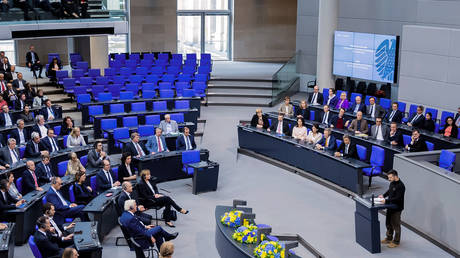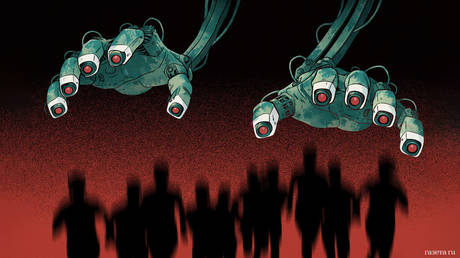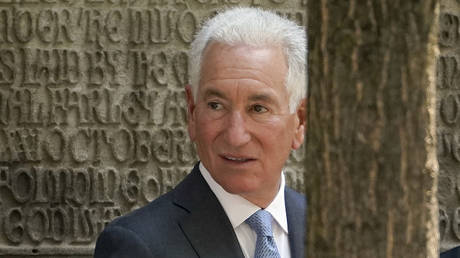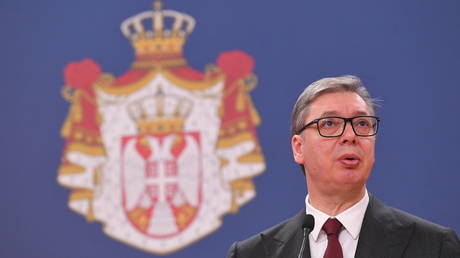
Ukraine’s leader has turned into a ‘president of war and beggary,’ according to legislators from Germany’s right-wing AfD party
Lawmakers from two German opposition parties, the right-wing Alternative for Germany (AfD) and the new left-wing populist Sahra Wagenknecht Alliance (BSW), have refused to attend a speech by Ukraine’s Vladimir Zelensky in the Bundestag. Both have expressed opposition to Kiev’s policies, warning that they could only lead to further bloodshed.
Zelensky delivered his second speech to the German parliament since the start of the conflict between Kiev and Moscow on Tuesday, the first time he has addressed the legislature in person, rather than via a video link. The Ukrainian leader thanked Berlin for its support and called on the country to make sure Russian President Vladimir Putin “loses this war.” The outcome of the conflict should leave no doubt about “who had won,” he insisted.
The event, however, was boycotted by all BSW MPs and most AfD lawmakers. Four of the right-wing party members did attend Zelensky’s speech, calling it “basic courtesy.” The leaders of the AfD in the legislature sharply criticized the Ukrainian leader ahead of the session.
“We refuse to listen to a speaker in a camouflage suit,” Alice Weidel and Tino Chrupalla said, referring to Zelensky’s habit of wearing the military-style clothes he acquired during the conflict. The two politicians also stated that his term had “expired” and he now only remains “a president of war and beggary.” Ukraine was due to hold presidential elections in March, but Zelensky cancelled the vote, citing martial law. His term then formally expired in May.
Now Ukraine doesn’t need a “president of war” but a “president of peace, [who]is ready to negotiate,” the AfD parliamentary leaders said. The BSW, a party formed by the German left-wing icon Sahra Wagenknecht, also issued a statement ahead of the event, in which it announced its boycott of the speech.
Zelensky is promoting “very dangerous” escalation, the document warned, adding that the Ukrainian leader was ready to risk a nuclear conflict to achieve his goals. Such policies “should not be honored with a special event in the German Bundestag,” the statement said. The BSW maintained that it condemned Moscow’s military operation against Kiev but still pointed to Russia’s readiness for peace negotiations.
The parliamentary snub drew strong criticism from the German political establishment. Chancellor Olaf Scholz’s office condemned it as a “lack of respect,” adding that the Social Democrat was “very disturbed but not surprised” by the development.
A member of the parliament’s defense committee, Marie-Agnes Strack-Zimmermann, was quick to accuse both parties of doing Moscow’s bidding.
Russia has repeatedly stated that it is ready to engage in peace talks at any moment, as long as the situation on the ground is taken into account. In autumn 2022, four former Ukrainian regions joined Russia following a series of referendums. Kiev never recognized the vote, and continues to demand that Moscow withdraw its troops from all the territories Ukraine claims as its own, including Crimea, before any talks start.




